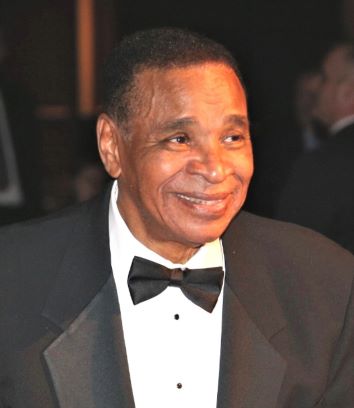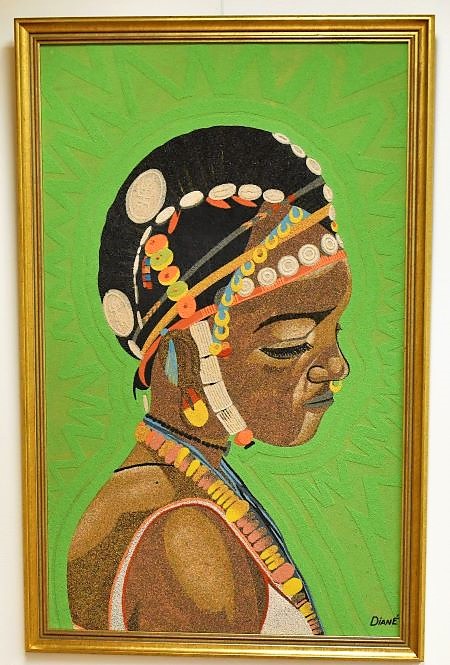
by Stuart A. Watson
Maryland State College alumnus C. Payne Lucas co-founded Africare, a non-government organization formed by veterans of the Peace Corps to focus on quality of life challenges faced by nations across Africa.
Known to friends and associates as “Luke,” he was born Sept. 14, 1933 in New Hope, N.C, one of William and Minnie Hendricks Lucas’ 14 children.
As a child, Lucas picked cotton to help support his family, overcoming rural poverty during the Great Depression to become president of a non-profit created to help people in Africa confronting the same challenges.
Along the way, he amassed an impressive collection of African art, some of which his estate bestowed to his alma mater and prompting one observer to describe him as one of this institution’s most important and influential graduates on a global scale.
Lucas initially enrolled in Maryland State College after graduating from high school in 1951, but the following year joined the Air Force, where he served four years. Upon his discharged, he returned to Princess Anne to earn an undergraduate degree in history in 1959. His alma mater awarded him an honorary doctor of law in May 1975.
After receiving a master’s degree in government from American University in 1961, he accepted a job with the fledgling Peace Corps, where he rose through the ranks to serve as assistant country director in Togo, country director in Niger, director of the Africa Region and director of the Office of Returned Volunteers.
When he met Kevin G. Lowther in 1966, Lucas was, “a legend at the Peace Corp” and poised to run that organization’s Africa Regional Office.
Lucas’ Peace Corps experience laid the foundation for Africare, which evolved from a request from Niger’s president Hmani Diori to rescue a struggling village health project called “Africare” – thus the name.
And so began a three-decade journey building the organization into a highly respected, African American and African-led institution. He was named Africare’s second president in 1971.
Lucas’ overseas work earned him the President’s Award for Distinguished Federal Civilian Service in 1967 and the 1984 U.S. Presidential World Without Hunger Award for Outstanding Individual Achievement “in the effort to achieve a world without hunger.”
Lucas did not attend that 1984 luncheon, held at the Kennedy Center, the New York Times reported in November 1984. Instead, he was in Africa, visiting refugee camps in Chad and other starving people elsewhere on the continent.
”Everyone is talking about Ethiopia today,” he told the newspaper, explaining his absence from the awards ceremony. ”But they are dying in Chad and Burkina Faso in the same way.”
By 1989, President George H. W. Bush remarked that “no group has addressed Africa’s agricultural problem better than Africare.”
Lucas’s dedication to world progress went beyond his involvement with Africare. He participated in a variety of organizations committed to international development and was invited to serve on numerous boards of directors.

He was widely admired as a speaker, writer and activist who “brought a unique blend of passion and steadfast commitment to his 40-year career in African development.”
Secretary of State James Baker said “No organization has done more than Africare to sensitize Americans to the suffering and the promise of Africa. No organization has a prouder record of mobilizing U. S. assistances to worthy causes.”
At the time of Lucas’s retirement in 2002, the organization had grown from a dream where it had to borrow $25, 000 to stay afloat, to underwriting 150 programs in 26 countries with an annual budget of $35 million dollars.
In remarks at his retirement dinner, Lucas noted:
“Africare’s greatest contribution—what I’m most proud of – is that we have now created an organization with an extended family. You are members of Congress and members of churches. You are black and white. You are African and American.
“When I look at the people in this room, when I feel the pulse, I know that we have the makings of a great institutions…this is just the beginning,” he said
Lowther paid tribute to his friend, writing: “It was in the Peace Corps and in the years he spent in Africa, guiding predominantly white volunteers in transcending race and culture that Luke began to shape strong feelings regarding ‘diversity.’”
Cleotha Payne Lucas Sr. died Sept. 15, 2018 in Silver Spring, Md., one day after his 85th birthday.

